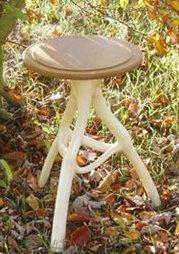Some questions are deceptively simple.For example: how do you know?The fancy philosophical word for this is “epistemology,” although that often takes it a step further to ask how do you know you know.Given that many powerful individuals are motivated by a Fundamentalist faith the question of how we know is more important than it might seem.Back in the days when faith commitments meant thinking such things through, theologians in the western world came up with three bases of knowledge: scripture, tradition, and reason.Anglicans, especially, favored this “three-legged stool.”If you removed any one of the three, the stool became unstable, topsy-turvy.The analogy worked well.It assumed that all three factors would be weighed against each other.

Image credit: Blackash at en.wikipedia
As time went on two developments occurred—the wider belief in science, and the work of John Wesley, a priest in the Church of England and founder of the Methodists.Science argued that reason alone led to knowledge, whereas Wesley’s thought suggested a fourth leg for the stool—experience.This latter configuration eventually became known as the Wesleyan quadrilateral, sometimes one leg was bigger (usually Scripture), but the other three could not be dismissed.Science, however, rested on a one-legged stool, reason alone.Fundamentalism, which is a fairly new form of religion, chooses Scripture as its one leg for a wobbly stool.It may sometimes claim “tradition,” but since it only dates to the nineteenth century its tradition can’t hold a candle to that of, say, Roman Catholicism.
Amid all the drama we see developing in the halls of government where, increasingly, the power to declare truth resides, it’s important to understand how we know.For a large and growing segment of society Scripture has been removed as a leg of the stool.For others it is the only leg.Having attended a United Methodist seminary, I admit the Wesleyan quadrilateral made great sense as soon as I heard of it.At the time I didn’t think of this, but if you remove Scripture, the stool still has three legs, and could stand for even a secular person.Scientists, if they examine their own precepts closely, could see that their stool has those three legs: tradition, reason, and experience.The largest, of course, is reason.Still, science builds on the work of earlier thinkers (tradition) and the observation of results (experience). Knowing how we know the truth has become a question that theologians would’ve never anticipated.The self-assured assertions of a self-convinced egoist don’t have a single leg to sit on.
